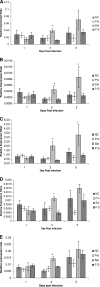Expression of antimicrobial peptides in cecal tonsils of chickens treated with probiotics and infected with Salmonella enterica serovar typhimurium
- PMID: 18827189
- PMCID: PMC2583514
- DOI: 10.1128/CVI.00242-08
Expression of antimicrobial peptides in cecal tonsils of chickens treated with probiotics and infected with Salmonella enterica serovar typhimurium
Abstract
Several strategies currently exist for control of Salmonella enterica serovar Typhimurium colonization in the chicken intestine, among which the use of probiotics is of note. Little is known about the underlying mechanisms of probiotic-mediated reduction of Salmonella colonization. In this study, we asked whether the effect of probiotics is mediated by antimicrobial peptides, including avian beta-defensins (also called gallinacins) and cathelicidins. Four treatment groups were included in this study: a negative-control group, a probiotic-treated group, a Salmonella-infected group, and a probiotic-treated and Salmonella-infected group. On days 1, 3, and 5 postinfection (p.i.), the cecal tonsils were removed, and RNA was extracted and used for measurement of avian beta-defensin 1 (AvBD1), AvBD2, AvBD4, AvBD6, and cathelicidin gene expression by real-time PCR. The expressions of all avian beta-defensins and cathelicidin were detectable in all groups, irrespective of treatment and time point. Probiotic treatment and Salmonella infection did not affect the expression of any of the investigated genes on day 1 p.i. Furthermore, probiotic treatment had no significant effect on the expression of the genes at either 3 or 5 days p.i. However, the expression levels of all five genes were significantly increased (P < 0.05) in response to Salmonella infection at 3 and 5 days p.i. However, administration of probiotics eliminated the effect of Salmonella infection on the expression of antimicrobial genes. These findings indicate that the expression of antimicrobial peptides may be repressed by probiotics in combination with Salmonella infection or, alternatively, point to the possibility that, due to a reduction in Salmonella load in the intestine, these genes may not be induced.
Figures

References
-
- Bar-Shira, E., and A. Friedman. 2006. Development and adaptations of innate immunity in the gastrointestinal tract of the newly hatched chick. Dev. Comp. Immunol. 30:930-941. - PubMed
-
- Bommineni, Y. R., H. Dai, Y. X. Gong, J. L. Soulages, S. C. Fernando, U. Desilva, O. Prakash, and G. Zhang. 2007. Fowlicidin-3 is an alpha-helical cationic host defense peptide with potent antibacterial and lipopolysaccharide-neutralizing activities. FEBS J. 274:418-428. - PubMed
-
- Castellazzi, A. M., C. Valsecchi, L. Montagna, P. Malfa, G. Ciprandi, M. A. Avanzini, and G. L. Marseglia. 2007. In vitro activation of mononuclear cells by two probiotics: Lactobacillus paracasei I 1688, Lactobacillus salivarius I 1794, and their mixture (PSMIX). Immunol. Investig. 36:413-421. - PubMed
-
- Ganz, T. 2003. Defensins: antimicrobial peptides of innate immunity. Nat. Rev. Immunol. 3:710-720. - PubMed
-
- Haghighi, H. R., M. F. Abdul-Careem, R. A. Dara, J. R. Chambers, and S. Sharif. 2008. Cytokine gene expression in chicken cecal tonsils following treatment with probiotics and Salmonella infection. Vet. Microbiol. 126:225-233. - PubMed
Publication types
MeSH terms
Substances
LinkOut - more resources
Full Text Sources

